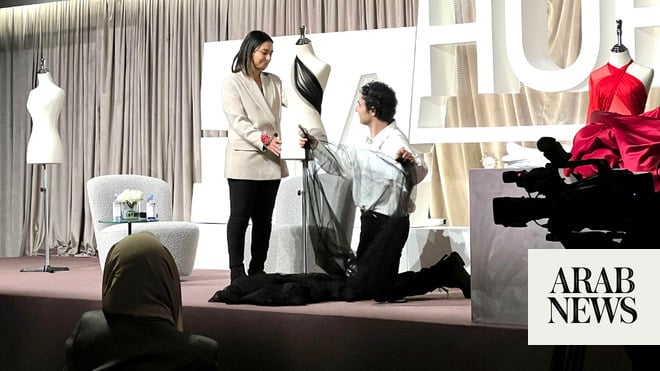[ad_1]
RIYADH: Local and international visitors attended renowned fashion designer Zac Posen’s live masterclass on gown draping techniques, intricacies of the fashion industry, and the process of starting a luxury brand at Diriyah’s Jax District in Riyadh.
The two hour masterclass also addressed the practical side of design. As he began dressing a mannequin in vibrant red fabric, using only scissors and pins, beginning his technique from the neck, Posen took questions from the audience.
“It’s all about purpose … Even if (a gown) is about exaggeration or glamor, for me, as big as it is, it has to be able to be worn,” he said.
“You can always keep going into a piece. Sometimes time runs out, and that’s the answer … There’s that moment when you kind of impromptu know that it’s ready. You’ll feel it.”
I think my journey and purpose is really to show everybody else that they can express through their creativity.
Zac Posen
Posen, known for creating iconic red carpet looks for A-list celebrities, is the son of American painter Stephen Posen, so artistry runs in the family.
His journey began when Posen found his calling for fashion backstage during numerous hours at the costume shop in high school.
“I think my journey and purpose is really to show everybody else that they can express through their creativity,” he said during the masterclass.
Surrounded by British models in the New York fashion scene in 1996, with the likes of Karen Elson, Erin O’Connor, and Jade Parfitt, Posen described it as a formative period.
“There was a new breath of air into fashion. I think the craft of fashion, especially in France and in Europe, was at a very high point and creativity, expression, and a new Romantic Movement had come into fashion,” the designer said.
Interning at the Costume Institute aged 16, the “life-changing” experience was the first time he had really understood the intricacies of clothing design on a deeper level and its historical significance.
“I grew up in a house where art is not about decoration. Art is about experience. Art is not about monetary value, it is about expression, experience, emotion, and storytelling. But I kind of started to understand that and take that on,” he said.
After spending the summer at Parsons New School for Design and within the bustling vibrancy of New York’s Garment District, he began developing his own design style, experimenting by making evening wear for his female friends.
In full immersion into the expressive underground drag queen culture of the city in the late 1990s, he shipped off to London to attend Central Saint Martins art school, which was a challenging but impressionable time for the designer.
“With high competition, you could not leave your clothing or anything you’re working on (at) a table. It would disappear, be chopped up, in the trash. You had to lock it up or take it home,” he said.
It was during his early days in London when Posen met Italian actress and style icon Anita Pallenberg, who took him under her wing and provided an opportunity to model in a campaign with John Malkovich for designer Bella Freud.
Two years into fashion school, the Posen buzz started around his designs and established a clientele base in London.
One of his designs had caught the eye of prominent model Naomi Campbell, who was determined to meet the designer, after she saw a dress worn by Posen’s friend on the Eurostar.
“She was incredibly kind and nurturing and wanted me to make her clothing, gave me money to buy fabric. We took her measurements … I started making her clothing and the buzz was building and then (a) New York Times writer called and said ‘I want to write an article about seeing this dress, and you, and the journey of this dress.’
“I knew that it could go either way, and I thought that opportunity is not a lengthy visitor, let’s try this,” he said.
The interview paid off, prompting notable attention from Barney’s, Fashion TV, and the Victoria and Albert Museum, which now showcases a multitude of his designs as part of its permanent collection.
He was then lured back to New York where he started his atelier in his parents’ living room, investing his $10,000 savings into the brand.
He then went on to produce a capsule collection for GenArt as part of their “Fresh Faces in Fashion New York 2001” show.
He is known for feminine designs that highlight the architecture of the body in a way that reflects the fluidity and softness of movement.
One of his biggest moments, Posen said, was when actress Natalie Portman wore one of his designs at the premier of “Star Wars: Episode I” following his first fashion show.
When the tragic events of 9/11 engulfed the residents of New York City, he felt that his hometown needed him through the tough times.
“Creativity, expression is what will bring back the city. It needs it. I felt it really strongly (that) I wasn’t going back to London, that wasn’t going to happen, this resilient force that I needed to be there,” he said.
Other highlight of his designing career incudes dressing up prominent figures and actresses such as Princess Eugenie of York, Uma Thurman, and Claire Danes.
“It’s not going to be necessarily the easiest road, being a creator, but it can be a very fulfilling role. You can make people feel very beautiful, and empowered, and happy, and really bring joy. And sometimes, those moments can add to a cultural narrative,” he said.
In the age of media and digital evolution, the designer believes that fashion is now evolving quicker than ever, and can become a tool in crossing cultural boundaries.
[ad_2]
Source link




